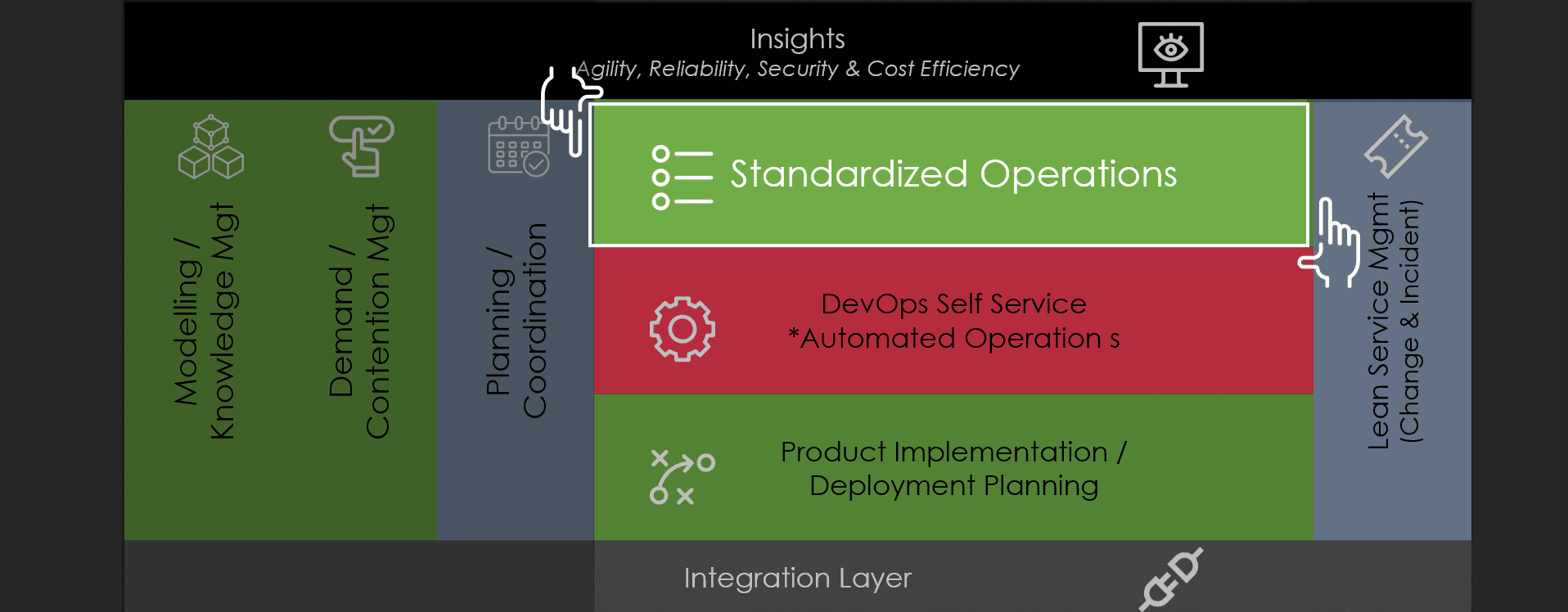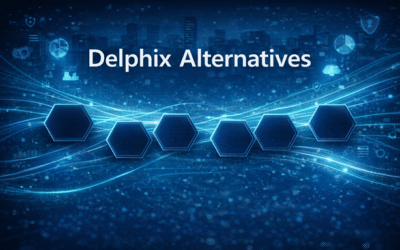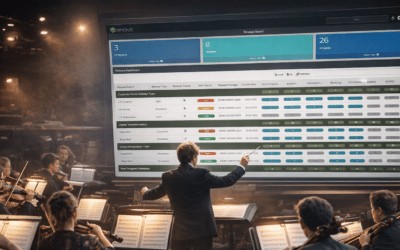
Standardised Operations (SOPs) & Runsheets for Test Environment Management
FEB, 2023
by Andrew Walker.
Author Andrew Walker
Andrew Walker is a software architect with 10+ years of experience. Andrew is passionate about his craft, and he loves using his skills to design enterprise solutions for Enov8, in the areas of IT Environments, Release & Data Management.
Enov8 IT & Test Environment Manager
*Innovate with Enov8
Streamlining delivery through effective transparency & control of your IT & Test Environments.
This paper will discuss the benefits and challenges of implementing SOPs in technology & management of the IT & Test Environments.
Overview of Standard Operating Procedures
Definition of Standard Operating Procedures (SOPs)
Standard Operating Procedures (SOPs) are a set of written instructions that document the steps required to complete a task or process. SOPs provide a consistent approach to completing tasks and processes, while also reducing risk and cost savings. SOPs are used in many industries, including technology & management of the IT & Test Environments.
The Need for SOPs in Technology & in the Management of the IT & Test Environments
Standard Operating Procedures (SOPs) are a set of written instructions that document the steps required to complete a task or process. SOPs provide a consistent approach to completing tasks and processes, while also reducing risk and cost savings. SOPs are used in many industries, including technology & management of the IT & Test Environments.
Benefits of SOPs
Standard Operating Procedures (SOPs) provide a number of benefits when implemented in technology & management of the IT & Test Environments. These benefits include:
A. Improved Efficiency and Productivity
SOPs provide a consistent approach to completing tasks and processes, which can lead to improved efficiency and productivity. By following SOPs, employees can complete tasks more quickly and accurately, resulting in increased efficiency and productivity.
B. Reduced Risk and Cost Savings
SOPs provide a framework for consistent and efficient operations, while also reducing risk and cost savings. By following SOPs, organizations can reduce the risk of errors and mistakes, which can lead to cost savings. Additionally, SOPs can help ensure compliance with industry regulations and standards.
C. Improved Quality Control and Compliance
SOPs provide a framework for consistent and efficient operations, while also reducing risk and cost savings. By following SOPs, organizations can reduce the risk of errors and mistakes, which can lead to cost savings. Additionally, SOPs can help ensure compliance with industry regulations and standards.
D. Increased Visibility and Accountability
SOPs provide a framework for consistent and efficient operations, while also increasing visibility and accountability. By following SOPs, organizations can ensure that tasks are completed correctly and on time, while also providing a record of who completed the task. This increased visibility and accountability can help ensure that tasks are completed correctly and on time.
Challenges of Implementing SOPs
Standard Operating Procedures (SOPs) provide a number of benefits when implemented in technology & management of the IT & Test Environments. However, there are also a number of challenges associated with implementing SOPs. These challenges include:
A. Time and Resources Required to Develop SOPs
Developing SOPs can be a time-consuming and resource-intensive process. Organizations must dedicate time and resources to developing SOPs that are comprehensive, accurate, and up-to-date. Additionally, organizations must ensure that SOPs are regularly updated as technology changes.
B. Difficulty in Ensuring Adherence to SOPs
Once SOPs are developed, organizations must ensure that employees adhere to them. This can be difficult, as employees may not be familiar with the SOPs or may not understand the importance of following them. Additionally, organizations must ensure that SOPs are regularly updated as technology changes.
C. Difficulty in Updating SOPs as Technology Changes
As technology changes, organizations must ensure that SOPs are regularly updated. This can be difficult, as organizations must dedicate time and resources to developing new or updated SOPs. Additionally, organizations must ensure that employees are trained on new or updated SOPs.
D. Difficulty in Training Employees on New or Updated SOPs
Once SOPs are developed, organizations must ensure that employees are trained on them. This can be difficult, as employees may not be familiar with the SOPs or may not understand the importance of following them. Additionally, organizations must ensure that employees are regularly trained on new or updated SOPs as technology changes.
Example of a SOP / Runsheet
In Test Environemnts Management, a good use of a Standard Operating Procedure woul be a Test Environment Shakedown.
And the Runsheet might look a bit like this:
Name: CRM Test Instance Shakedown
- Select the CRM Test Instance required e.g. UAT
- Check System Instance is Available by Login
- Check Test Users have Access
> Refer Booking Request for Specifics of users.- Check Test Data Loaded
> Refer Booking Request for Specifics of data.- Test Instance is Functional by running a E2E Transaction
> Use: CRM weekly call report.- Take a “snapshot” / backup of Instance
> Note: This allows us to rollback/restore during test cycle.- Send out “shakedown” notification of success to stakeholder.
- If good, tell Test Team they can commence QA cycle.
Simplify your SOP objectives via a Runsheet Management Tool
A tool like Enov8 Enviornment Manager, with inbuilt Runsheet Management capability, can help simplify the process of implementing SOPs in technology & management of the IT Environments. Whether the tasks are manaual or automated, the Enov8 solution provides a centralized platform for creating, managing, and tracking SOPs real-time. Additionally, this tool can help ensure that SOPs are regularly audited and updated so they never get out dated.
Enov8 Environment Manager, Runsheet: Screenshot
Conclusion
Standard Operating Procedures (SOPs) provide a number of benefits when implemented in technology & management of the IT & Test Environments. These benefits include improved efficiency and productivity, reduced risk and cost savings, improved quality control and compliance, and increased visibility and accountability. However, there are also a number of challenges associated with implementing SOPs, including the time and resources required to develop SOPs, difficulty in ensuring adherence to SOPs, difficulty in updating SOPs as technology changes, and difficulty in training employees on new or updated SOPs. A tool like Enov8 Environment Manager can help simplify the process of implementing SOPs in technology & management of the IT Environments.
Other Reading
Enjoy what you read? Here are a few more articles that you might find interesting.
Enov8 Blog: Test Environment Management Explained.
Enov8 Blog: Test Environment Planning & Coordination
Enov8 Blog: Test Environment Management Modelling
Relevant Articles
Duck Creek Data Masking in Depth: A Guide
Insurance platforms are data-heavy by design. Customer identities, policy records, payment details, underwriting notes, claims histories. In a Duck Creek ecosystem, that data powers critical business processes across policy, billing, and claims. It also creates...
What is a Microservice Catalog? A Detailed Explanation
Microservices have revolutionized the way modern software systems are designed and developed. Breaking down complex applications into smaller, independently deployable services brings numerous benefits in terms of scalability, flexibility, and maintainability....
Delphix Alternatives: 7 to Consider in 2026
If you’re searching for delphix alternatives, you’re likely evaluating your test data management strategy. Delphix is widely recognized for data virtualization and masking, but it is not the only option available. As enterprise environments grow more complex and...
Enterprise Release Manager: A Guide to the Role
Do you want your company to scale efficiently? Look for an enterprise release manager (ERM). An ERM protects and manages the movements of releases in multiple environments. This includes build, test, and production environments. They ensure that there is a proper...
Data Governance Tools: 7 to Know in 2026
As data estates continue to grow in size and complexity, governance has shifted from a documentation problem to an execution problem. Data now spans cloud warehouses, operational systems, analytics platforms, streaming pipelines, and AI workflows, often owned by...
A Detailed Guide to Temenos Data Masking
Temenos powers core banking operations for financial institutions around the world. From customer onboarding and account management to payments and lending, it sits at the heart of highly regulated, data-intensive environments. That central role creates a challenge:...












